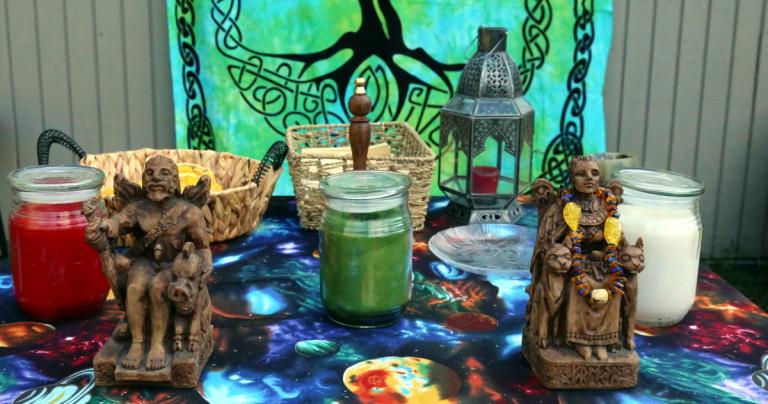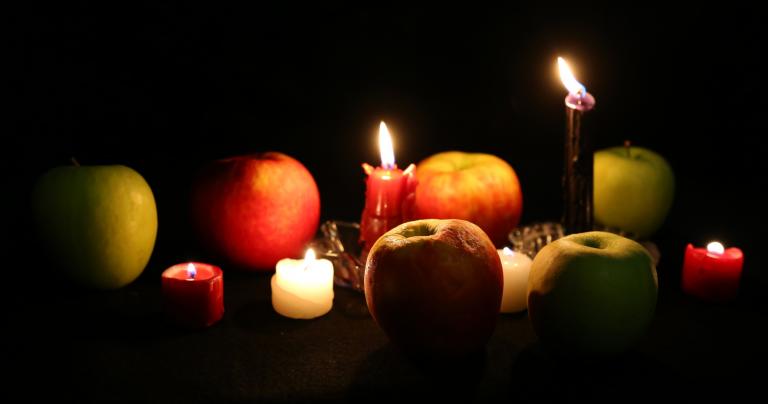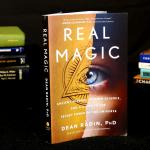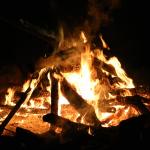Ah, September! When the worst of the summer heat is past, all the kids are back in school, football is in full swing… and the annual knock-down drag-out arguments over the proper name for the celebration of the Autumn Equinox begin.
Our Celtic ancestors left us definitive names for the four fire festivals: Imbolc, Beltane, Lughnasadh, and Samhain. We know what to call them – we just argue about how to pronounce and spell them. But the names for the solstices and equinoxes are anything but certain.
From the Norse tradition, Modern Paganism adopted Yule for the Winter Solstice. We adopted Ostara for the Spring Equinox from the Anglo-Saxons, even though the evidence for it is minimal. A few Pagans adopted Litha for the Summer Solstice, but mostly I hear it called Midsummer or simply the Summer Solstice. I occasionally see Pagans arguing against the historicity of Ostara or insisting that Litha is a “hobbit holiday” but nobody really gets worked up about them.
They save their hate for Mabon.
Who is Mabon?
The name Mabon appears only once in literature, in the Welsh tale Culhwch and Olwen, which is part of The Mabinogi. The oldest written version we have dates to 1325 CE – literary scholars date its original writing to sometime in the 11th century.
Mabon’s full name is Mabon ap Modron, which translated means “Son, son of Mother.” The tale says “He was taken from his mother when three nights old, and it is not known where he now is, nor whether he is living or dead.” Finding him is part of the list of seemingly impossible tasks Culhwch must complete in order to win the hand of Olwen from her father. When Culhwch finds him, there is this exchange:
“No imprisonment was ever so grievous as mine.”
“Hast thou hope of being released for gold or for silver, or for any gifts of wealth, or through battle and fighting?”
“By fighting will whatever I may gain be obtained.”
With the help of King Arthur (yes, that Arthur) Mabon was freed, and he helped Culhwch complete his tasks and win his bride.
And we never hear from him again.
How did Mabon become the name of the Autumn Equinox?
For that, you have to jump forward in time a bit – to 1974.
Occasional Patheos blogger Aidan Kelly gets the credit – or the blame – for associating Mabon with the Fall Equinox. He told the full story in a post last year. Since Spring is associated with Kore (Persephone), Aidan wanted a similar myth to associate with Fall. Here’s an excerpt:
I began looking for a similar sort of myth in northern Europe. I could not find one in Germanic or Gaelic literature, but there was one in the Welsh, in the Mabinogion collection, the story of Mabon ap Modron (which translates as “Son of the Mother,” just as Kore simply meant “girl”), whom Gwydion rescues from the underworld, much as Theseus rescued Helen. It would have been aesthetically better to have found a Saxon name, but [there wasn’t one] so I picked “Mabon” as the name for the holiday in my calendar. It was not an arbitrary choice. I sent a copy of the calendar to Oberon (then still Tim), who liked these new names and began using them in Green Egg, whence they passed into the national Pagan vocabulary.
Like it or don’t like it, that’s how it came to be.
So what’s the problem?
The first problem is that the name has no ties to our ancestors. It’s not “authentic” – and we like authentic.
The fact that none of the Northwest European cultures had a name for the Fall Equinox is a pretty good sign it wasn’t very important to them. Modern Pagans celebrate the Fall Equinox because it’s one spoke on the Wheel of the Year.
An apocryphal story says the Wheel of the Year was invented at an English naturist (i.e. – nudist) retreat. Gerald Gardner (founder of Wicca) wanted to celebrate the solstices and equinoxes, while Ross Nichols (founder of OBOD) wanted to celebrate the fire festivals. So they decided to do both. It’s a cool story that ought to be true, whether it is or not.
But in his big reveal to the ordinary world Witchcraft Today (1954) Gardner didn’t mention the solstices and equinoxes. In Witchcraft For Tomorrow (1978) Doreen Valiente simply calls it the Autumn Equinox.
The second problem is that while there was some logic behind Aidan Kelly’s choice, the fact remains that there is nothing in lore or practice that connects Mabon with the Autumn Equinox. Ostara feels genuine, whether it is or not. Mabon doesn’t.
The complaints
This comment on Aidan Kelly’s post from C Hobley is fairly typical of the Mabon hate I see every September.
I never knew who came up with the names or the history behind the – what I consider Wiccan – names. Now I know who to blame. As long as I live… I will correct people away from these.
I can’t figure out what their complaint is, but they don’t like it, that’s for sure.
This post from Yvonne Aburrow makes what is probably the best argument against calling the Autumn Equinox Mabon.
Calling the Autumn Equinox “Mabon” has no ancient precedent whatever, and does have the effect of erasing what the god Maponos is really about, and obscures the fact that the autumn equinox was not marked by ancient pagans as the autumn equinox.
The erasure complaint is based on an association of Mabon with Maponos. That’s a reasonable conclusion, but not a certain one.
Honour Mabon as a Wizard, a Merlin type figure, as the oldest of men and beasts, honour him as the Son of the Mother, and a hero – don’t take that away from him by ignorantly using his name as if it is a different word for Autumn Equinox.
Brian Walsh said Mabon is “A God of Spring Misplaced.”
Jason Mankey wrote on this topic in 2015. One commenter insisted that calling it Mabon is cultural appropriation. I’m a strong proponent of respecting different cultures, but even if this is wrong it’s a serious stretch to call it cultural appropriation.
What else can we call it?
Peg Aloi’s 2007 WitchVox essay You Call it the Autumn Equinox, We Call it Mabon lists several other possible names, including Harvest Home, Cornucopia, and the Feast of Avalon. In 2014 Jason Mankey pointed out that “the English holiday Harvest Home was a very real holiday for centuries.” He also said that Bede – who gave us Ostara – had a name for September: Haligmonað, which means “holy month.”
OBOD calls the Autumn Equinox Alban Elfed, which means “The Light of the Water.” Kristoffer Hughes – Head of the Anglesey Druid Order and a native Welsh speaker – says that “Alban” is more accurately translated as “the high point of” and that Alban Elfed would be best understood as “the high point of Autumn.”
This year will be the 5th year in a row that Denton CUUPS has celebrated Gleichentag at the Fall Equinox. We got the idea from an ADF ritual by that name – it means “even day.” This is the time when our members who follow a Northern path do something from their traditions. This year’s circle will honor Odin and Freya.
After five years of Gleichentag, I don’t think much about what to call this holy day. Now it’s just Gleichentag.
Unless I want to make sure other Pagans know what I mean.

Aidan Kelly’s name stuck for 40 years
When I wrote a solitary ritual for the Autumn Equinox in 2015 I called it Mabon – A Solitary Ritual. I briefly touched on the name controversy, and I wrote the ritual to honor Manannán mac Lir, even though He’s usually associated with the Summer Solstice (for reasons I explain in the ritual).
I called it Mabon because I wanted Pagans looking for a solitary ritual to be able to find it, and most of them are going to Google “Mabon ritual.” If I had called it “Harvest Home – A Solitary Ritual” Google wouldn’t find it, and neither would the Pagans looking for it.
Like it or not, after 40 years of usage Aidan Kelly’s name has stuck.
I’ve only got enough energy for a few battles, and fighting for a more proper name to the Autumn Equinox isn’t very high on my list of priorities.
If you don’t like “Mabon” call it something else!
If your tradition has a name for the Autumn Equinox, that’s the name you should use. Talk about it enough other and people may start to use it too. Whether you want Wiccans and Druids and Solitary Pagans using your name is another question.
If you just can’t stand to hear it called Mabon, then by all means call it something else. Again, if you get enough people doing it, it may catch on. 40 years of usage is long enough to fix something in people’s minds, but it’s certainly not long make it something that can’t be changed.
But every time you scream “don’t call it Mabon!” or “Mabon has nothing to do with the Fall Equinox” you perpetuate the name in common usage. Part of that is the modern Pagan attitude of “you can’t tell me what to do!” but part is simple psychology. The more people hear something the more they remember it, whether it’s good, bad, or indifferent.
Language is a living thing, and English especially so. Grammar, pronunciation, word usage, and word meaning all change over time. The name of the Autumn Equinox has changed many times, and it can change again. But if it does, it will be because enough people flock to a new name, not because Mabon gets shouted down on the internet every September.
May your Autumn Equinox be happy and fruitful, whatever you choose to call it.

















